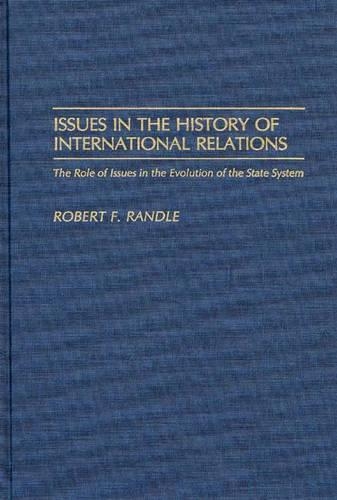
Issues in the History of International Relations: The Role of Issues in the Evolution of the State System
(Hardback)
Publishing Details
Issues in the History of International Relations: The Role of Issues in the Evolution of the State System
By (Author) Carol Rapp
Bloomsbury Publishing PLC
Praeger Publishers Inc
30th October 1987
United States
Classifications
Tertiary Education
Non Fiction
327
Physical Properties
Hardback
320
Description
Using diplomatic historical evidence, Issues in the History of International Relations examines the nature of the process of state system change and follows the actual structural changes in the Western European State System from 1500 to its transformation into a global system in the 20th Century. Professionals, as well as students of international politics or political theory, can turn to this new volume for a new issue-approach to international relations.
Reviews
A dense theoretical analysis in which the rise, evolution, and resolution of international issues determine the constitutions (power position hierarchy and ordering principles) of successive state systems, and cause their transformation. The characteristics of issues; constitutions; peace setttlement regimes; issue network systems, both aggregated and disaggregated; and transformation processes are delineated. Specialists and graduate students will appreciate the comprehensiveness, rigor, and clarity of the analytical framework, which marks an advance in issue theory, using also social network theory. It complements Richard W. Mansbach and John A. Vasquez's In Search of Theory ((CH, Jun 81). Randle's painstaking if condensed historical examination covers five centuries before arriving at the present global state system, and is buttressed by extensive and illuminating tables and figures. It shows the utility of his model in getting to the heart of discrete historical eras and the issues leading to their crystallization and decomposition. Brief bibliography and index; useful chapter notes.-Choice
"A dense theoretical analysis in which the rise, evolution, and resolution of international issues determine the constitutions (power position hierarchy and ordering principles) of successive state systems, and cause their transformation. The characteristics of issues; constitutions; peace setttlement regimes; issue network systems, both aggregated and disaggregated; and transformation processes are delineated. Specialists and graduate students will appreciate the comprehensiveness, rigor, and clarity of the analytical framework, which marks an advance in issue theory, using also social network theory. It complements Richard W. Mansbach and John A. Vasquez's In Search of Theory ((CH, Jun 81). Randle's painstaking if condensed historical examination covers five centuries before arriving at the present global state system, and is buttressed by extensive and illuminating tables and figures. It shows the utility of his model in getting to the heart of discrete historical eras and the issues leading to their crystallization and decomposition. Brief bibliography and index; useful chapter notes."-Choice
Author Bio
ROBERT F. RANDLE is Professor of Political Science at National Defense University.
